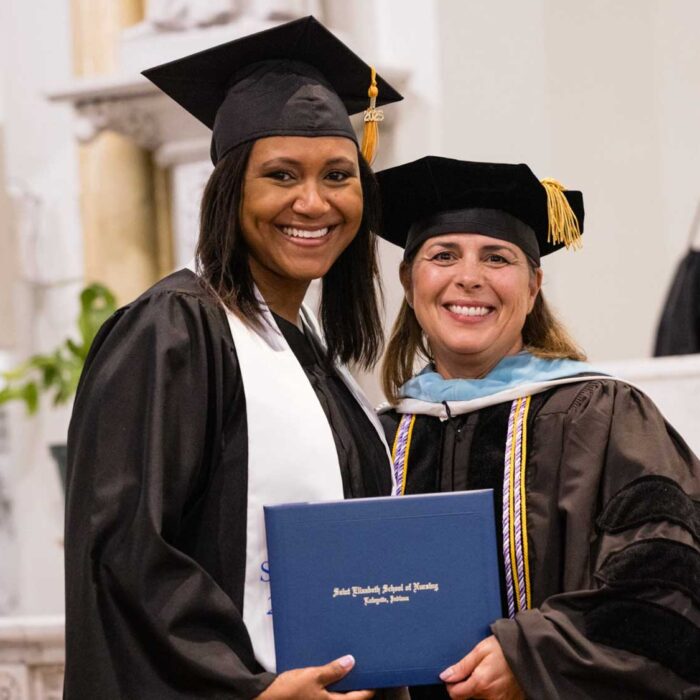Although better known as an icon of nursing in general, Nightingale’s long career saw her make the shift from practicing nurse to nurse educator. Her writings, methods and principles helped forever redefine the way the world trained new nurses. Her work is one of the great cornerstones that St. Elizabeth School of Nursing continues to build upon today.
Please enjoy this brief overview of Florence Nightingale’s life and career. Her story is an inspiration to anyone looking to make an impact on the world as a nurse or nurse educator.
Before the call
Nightingale wanted to be a nurse from a young age but heeding this call was a different story in her time. In the aristocratic heart of England’s Victorian era, nursing was seen as a low-status profession, but Nightingale belonged to a wealthy, upper-class family.
In her early adulthood, Nightingale caught the eye of a respected politician: Lord Richard Monckton Milnes, the Baron of Great Houghton. Nightingale’s friends, family and social circle placed enormous pressure on her to accept the baron’s marriage proposal and act in the role of a statesman’s wife. It was a role that many women living in the time period would have dreamt of having, but for Nightingale, it simply wouldn’t do. She’d heard the call to nursing, and she refused to ignore it. Instead, she rejected the proposal and set out to pursue her own path.
Florence Nightingale the nurse
With nursing education options scarce in England at the time, Nightingale traveled to Germany for formal training. Afterwards, she returned home and began work as a nurse in a London hospital. Just one year later, in 1854, Nightingale volunteered to serve as a nurse in Crimea, where England was engaged in a war against Russian forces.
Nightingale was shocked by what she witnessed at the English-occupied hospital in Crimea. Sick and wounded soldiers overwhelmed the facility’s small staff. The building’s plumbing system was nonfunctional with rarely-changed chamber pots serving as its replacement. Instead of proper hospital beds, mattresses were strewn across the building’s filthy floors, their sheets allowed to go uncleaned and their insides riddled with lice. Amputations were performed out in the open while other patients looked on in horror.
With an eye for detail that balanced human compassion with clinical reality, Nightingale compiled intricate reports on the hospital’s conditions, smashing through layers of bureaucracy to demand better treatment for her patients. Her superiors heard her demands, and soon, Nightingale was overseeing an entire overhaul of the Crimean hospital, including its operational policies and sanitation practices.
Nightingale had a gift for navigating the limitations that were placed on women at the time. In one particular feat of boldness, she broke the convention of nurses leaving soldiers’ bedsides by nightfall, preferring to patrol the hospital with a lantern to ensure no patient suffered through the night. This practice earned her the famous nickname, “The Lady with the Lamp.”
As survival rates skyrocketed at the hospital, Nightingale quickly accrued a reputation both as a shrewd administrator and a compassionate healer. Back in Britain, word spread of the “Lady with the Lamp” who was reforming healthcare on the frontlines of Crimea to astounding effect. A drawing of the stately Nightingale with her iconic lantern was circulated in newspapers alongside reports of her accomplishments, and people from all of London’s social classes fell in love with her story.
Florence Nightingale the nurse educator
England greeted Nightingale as a celebrity upon her return from Crimea. She quickly put her newfound status and adoration to good use, petitioning the government to implement further reform in the military’s healthcare system. She also applied for a grant to open her own nursing school, and she was met with enthusiastic approval. Now Nightingale was able to imprint all she had learned in Crimea upon fresh and eager minds.
The quality of education that Nightingale’s school offered set a new standard in the field. Nightingale also used her experiences in Crimea as the basis for her instructional book, Notes on Nursing, published
in 1859. The ripples of this book are still felt today in modern nursing education, and rest assured that a copy can be found in St. Elizabeth’s School of Nursing library.
Aside from the vast amount of practical advice contained in its pages, Notes on Nursing’s portrayal of nursing as a science and a craft forever changed how the profession was perceived. Almost single-handedly, Nightingale had legitimized nursing in the eyes of the world.
Nightingale’s story is so incredible for several reasons. When she first heard the call to nursing, Nightingale answered it despite overwhelming pushback from society. Then, after she had already accomplished more within the profession than anyone thus far, she answered the call beyond the call and became a nurse educator for the next generation. Nightingale’s legacy is an example we hold dear at St. Elizabeth School of Nursing, and we believe comparable figures will arise from the quality of nursing education we deliver within our walls.
“The most important practical lesson that can be given to nurses is to teach them what to observe, how to observe, what symptoms indicate improvement, what the reverse, which are of importance, which are of none, which are the evidence of neglect, and of what kind of neglect.”
Florence Nightingale, Notes on Nursing
As seen in the The Lamp fall 2022 issue
















